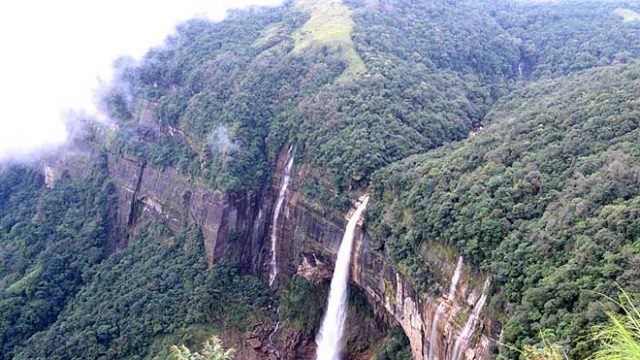It’s home to the wettest place on earth. The good news: that’s the least exciting thing about it. Meghalaya is most conveniently accessed from Assam. A helicopter service connects Guwahati with Shillong and Tura. Buses and shared taxis ply regularly between Guwahati and Shillong (100km).
Shillong
Chaotic growth has greatly altered the character of this once-idyllic hill town. Yet, look beyond the dirt and grime, and there are quiet little nooks, where colonial grandeur lives on. Surely the best way to experience Shillong is to stay in some of the heritage accommodation it offers. Only a few minutes’ walk from Ward’s Lake, Hotel Pinewood (0364-2223116) was built in the 1920s and is patterned on an English country home. Set in nine acres of forest, Tripura Castle was established by Maharaja Bir Bikram Manikya Deb Burman of Tripura. Accommodation here is offered in a charming annexe—the Royal Heritage (0364-2501111)—complete with warm wood interiors, brass fireplace and art deco furniture. Boasting one of the prettiest golf courses in the country, the historic Shillong Club (0364-2226938) takes in guests on prior notice. Built in 1935, Rosaville Guest House (0364-2231248) is a remarkable piece of neo-colonial architecture, its interiors filled with period furniture and bric-a-brac.
Garo Hills
Lush and wild, the Garo hills ooze with life—bamboos leap profusely from the earth, vines piggyback on them for their share of the sun, the forest are lovely, dark and deep. Base yourself in Tura, HQ of the West Garo Hills district, and the largest town in the area. Stay at Rikman Continental (03651-220744). Dabakgre, 45km away, is a “typical Garo village” where you can see the remarkable tree houses of the Garos. The forests of Baghmara, in the South Garo Hills, are home to the carnivorous pitcher plant. There’s a Tourist Bungalow here, as well as forest rest houses. Balpakram National Park is home to the lesser panda, Indian bison and the stag-like serow.
Caving
Three magic ingredients—limestone, elevation and lashing rain–have bored eerie, snaking labyrinths into the hills of Meghalaya, some over 20km long. The most remarkable cave systems lie in the Jaintia hills. Well-known caves include Krem Sweep at Syndai, Krem Kotsati and Um-Lawan at Lumshnong and Krem Mawmluh near Cherrapunji. Contact the Shillong-based Meghalaya Adventurers’ Association; 0364-2545621/ 2548059). For logistical regions they no longer offer caving in the South Garo Hills, home to the enormous Dobhkakol (at Siju) and Telengkol caves. For that contact Meghalaya Tourism in Tura, 03651-242394.
Cherrapunji
Cherrapunji is a pilgrimage for met-nuts. It has received the heaviest recorded rainfall on the planet for over a century, although nearby Mawsynram is currently ahead in the wet stakes. (Cherra locals snort at such suggestions, of course). But there’s more. Cherra’s home to a revered theological college and Nongsawlia Church, the oldest in the region. It is here that the first Welsh missionary set up base in 1841. Tourist attractions include the Nohkalikai and Nohsngithiang Falls (best seen after the rains) and the illuminated Mawsmai cave. Cherrapunjee Holiday Resorts is 16km away at Laitkynsew (0364-2226706, 094361 15925; cherrapunjee@hotmail.com).
Meghalaya: Exploring the diverse landscapes
From the untamed Garo hills to the rice bowl of the Jaintias--and somewhere in between, the happening capital Shillong--Meghalaya carries its contrasts well

Meghalaya: Exploring the diverse landscapes
Meghalaya: Exploring the diverse landscapes



